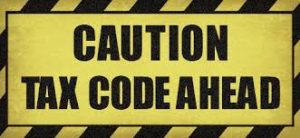Here’s what’s up! America needs tax compliance to pay government’s bills. In all seriousness, voluntary compliance is a principle that we will cooperate with the tax system by filing honest and accurate annual returns and receive excellent customer service along the way.
 REINFORCING THE BASICS.
REINFORCING THE BASICS.
Frivolous. Not having any serious purpose or value.
Frivolous Tax Argument. You’re a special kind of stupid if you still think this will work.
Internal Revenue Code. Federal statutory tax LAW.
Paradox. An absurd or self-contradictory statement that when investigated or explained may be true. Examples: Filing a tax return is voluntary. Paying income tax is voluntary.
FIRST THINGS FIRST.
Snopes fact check. Claim – Payment of U.S. federal income taxes is voluntary. Rating – False.
IRS fact check. Frivolous tax argument.
Frivolous tax arguments are divided into categories, one of which is: The Voluntary Nature of the Federal Income Tax System. That being said, let’s move on to why these popular arguments are really false and frivolous and NOT voluntary.
In the beginning, (a future blog), way back in 1914 the Commissioner of Internal Revenue had to examine each and every tax return. Eventually, by 1954, this got to be a little much and some commissioner had to figure out a better way to get the bills paid. Literally and figuratively, “more bang for the buck.” And the solution was to get businesses and individuals to do these examinations themselves thus making the tax system “voluntary”.
IS IT LEGAL? Why yes; yes, it is.
The Internal Revenue Code is all the laws Congress has passed to get us to fund America. There is a little section in the Internal Revenue Code (IRC) that according to the IRS “clearly imposes” tax on individual, estate, and trust income. In 1938, the Supreme Court  upheld Congressional impositions of sanctions to ensure full and honest taxpayer disclosure and to discourage tax evasion. There is another little section in the IRC that according to the IRS, “the obligation to pay tax is described in section 6151, which requires taxpayers to submit payment with their tax returns”.
upheld Congressional impositions of sanctions to ensure full and honest taxpayer disclosure and to discourage tax evasion. There is another little section in the IRC that according to the IRS, “the obligation to pay tax is described in section 6151, which requires taxpayers to submit payment with their tax returns”.
THEN WHAT EXACTLY IS MEANT BY VOLUNTARY?
The IRS perspective, if you pay, without being audited – that is voluntary. Voluntary means – without government involvement or compulsion. As far as government involvement, the government is neither calculating the tax liability nor completing the return. But what about compulsion? The government looks at this as persuasion. Laws have valid reasons that inspire persuasive, intrinsic motivations to abide by them. Therefore, actual payment of the tax is voluntary. The filing of a tax return is voluntary. And there you have what is meant by voluntary compliance. But what about the taxpayer perspective? From our perspective, we have no choice, so voluntary is, “comply or else”. We don’t pay taxes because we want to; we pay because we are convinced that we have to. We have to because of the “or else”.
AND WHAT IS THE “OR ELSE”?
The “or else” is compliance by enforcement.
The penalty for filing a frivolous tax return is $5,000.
Additional penalties are accuracy-related; civil fraud; erroneous refund claim; failure to file; and, failure to pay.
Tax Court can even slap a penalty on you for making a frivolous argument in court.
There is criminal prosecution for attempting to evade tax.
Filing a false return is a felony as is promoting frivolous arguments.
Then there are fines, interest charges, levies, garnishments, liens, prison.
A famous guy, Thomas Aquina, intellectualized this in the 12th century. A voluntary act is born of will and led down its path by knowledge of the end result. Problematic things such as ignorance, passion, and rational fear can reduce the level of voluntariness, but not make an act involuntary. Paradox-Point IRS.
A famous firm, McAtee & Associates, intellectualizes voluntary compliance, in essence, as fear of the “or else”. Paradox-Point IRS.
WHAT ARE THE OTHER FRIVOLOUS TAX ARGUMENTS?
First there are several other arguments in the Voluntary Nature category:
1. Taxpayers can reduce their federal income tax liability by filing a “zero return”;
2. The IRS must prepare federal tax returns for a person who fails to file; and,
3. Compliance with an administrative summons issued by the IRS is voluntary.
Then there are quite a few more in some categories. And the categories are:
The Meaning of Income: Taxable and Gross;
The Meaning of Certain Terms Used in the Internal Revenue Code;
Constitutional Amendment Claims;
Fictional Legal Bases; and,
Collection Due Process Cases.
We think that some of these arguments are pretty interesting and have a certain logic so we are definitely going to do future blogs highlighting one or two arguments from each category, except for maybe Collection Due Process Cases, which sounds horribly boring.
WHAT ELSE SHOULD I KNOW?
⇒ Frivolous Tax Arguments is a recurring scam on the IRS’ “Dirty Dozen” list of tax scams.
⇒ We’ll cover the rest of the “Dirty Dozen” in a future blog.
⇒ Shameless Plug. Voluntarily have McAtee & Associates assist you in the preparation and filing of your individual and business tax returns.
Reach out to McAtee and Associates for answers and guidance all things tax. CallCarolFirst! Carol would enjoy doing some tax planning and advising with you and assisting you with tax preparation and filing.
info@accpas.com OR 727-327-1999.
Check back here next week for a new and entertaining blog. And be sure to like us on FaceBook and follow us on Twitter; for whatever it is we’ll be posting.
ANY TAX ADVICE IN THIS COMMUNICATION IS NOT INTENDED OR WRITTEN TO BE USED, AND CANNOT BE USED, BY A CLIENT OR ANY OTHER PERSON OR ENTITY FOR THE PURPOSE OF (i) AVOIDING PENALTIES THAT MAY BE IMPOSED ON ANY TAXPAYER OR (ii) PROMOTING, MARKETING OR RECOMMENDING TO ANOTHER PARTY ANY MATTERS ADDRESSED HEREIN.
